Travel Grants in 2022
In 2022 the College awarded 29 Kellogg College Travel Grant Awards to its DPhil and MPhil students to help assist with travel, registration and attendance costs when presenting their work at conferences, or to help meet the travel expenses of research trips.
A few of these students share with us how they benefitted from their grant.
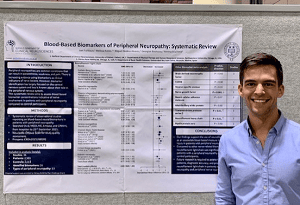
The Kellogg Travel Grant was essential in allowing me to present at the International Association for the Study of Pain Congress 2022. This is the world’s largest gathering of clinicians and researchers interested in advancing pain research.
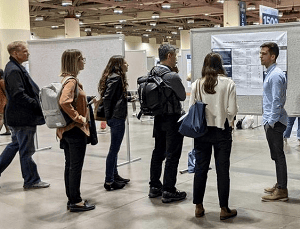
I presented my recent research regarding blood-based biomarkers of peripheral neuropathy. My findings synthesize a number of exciting biomarkers that are highly relevant to both clinicians and researchers studying an important painful condition. I am very grateful to Kellogg for the opportunity to attend this conference and present my latest research.
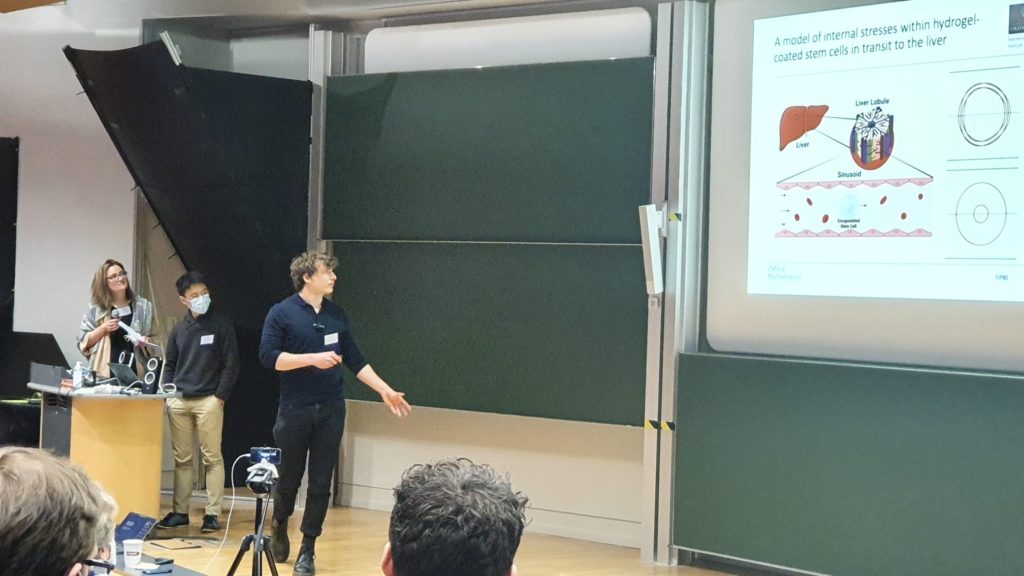
In March and April of 2022, Simon Finney attended two conferences: TJP80, a two-day conference organised by the former students/postdocs and colleagues of Prof Tim Pedley FRS, addressing recent research breakthroughs in biological and biomedical fluid mechanics, in honour of his 80th birthday; and the the British Applied Mathematics Colloquium 2022 (BAMC22).
Simon’s presentation at TJP80 covered his research at the Oxford Centre for Industrial and Applied Mathematics and was entitled A model of internal stresses within hydrogel-coated stem cells in transit to the liver.
Simon told us ‘I had a wonderful time at both conferences. Presenting my research to these communities is invaluable for generating new ideas and collaborations.’
Watch Simon’s presentation here (from 23:25)
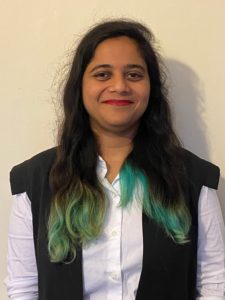
My name is Sheetal Jain, I am a third year DPhil student in the Faculty of History.
My research is on an organisation called All India Hindu Mahasabha, focusing on the politics of India. My DPhil research is dependent on archives, located specifically in India. This grant allowed me to visit National Memorial Museum and Library and National Archives of India located in New Delhi, India.
In my visit to the archives, I got the chance to examine the collection of papers of Hindu Mahasabha, Police records, and Census papers which are located in the Nehru Memorial and National Archives. I also examined the Microfilm section of Nehru Memorial which has Private papers and Newspaper collections. The documents gave me an idea to structure my thesis. I plan to build my thesis over the documents that I found during my research trip to India.
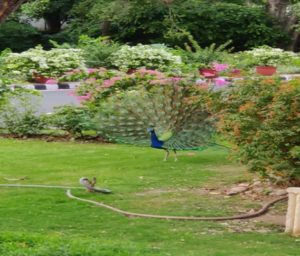
Peacock outside Nehru Memorial Museum and Library, New Delhi
Gaining access to the archives in India was crucial for me to complete my DPhil thesis project. I am extremely grateful to Kellogg for providing me with much needed financial assistance that helped me accomplish my DPhil research.

The Kellogg Travel Grant enabled me to travel to Washington DC to conduct essential archival research for my DPhil thesis. I originally planned to travel in March 2020, but had to cancel due to the Covid-19 pandemic, so it was wonderful to finally be able to make the journey across the pond to access documents and manuscripts at the US National Archives, and the Library of Congress, that are key to my doctoral project.
I had a wonderful time in DC – the cherry blossoms were also in full bloom – and with the help of friendly archivists and librarians, I was able to make the best use of the resources available. The Library of Congress was spectacular and working in the Main Reading Room felt quite surreal. The materials I looked at have set me well on my way in the final year of my DPhil and I am very excited at the prospect of writing up my findings. I am so very grateful to Kellogg for contributing towards my travel costs for what has been a very memorable experience.
Urvi Khaitan
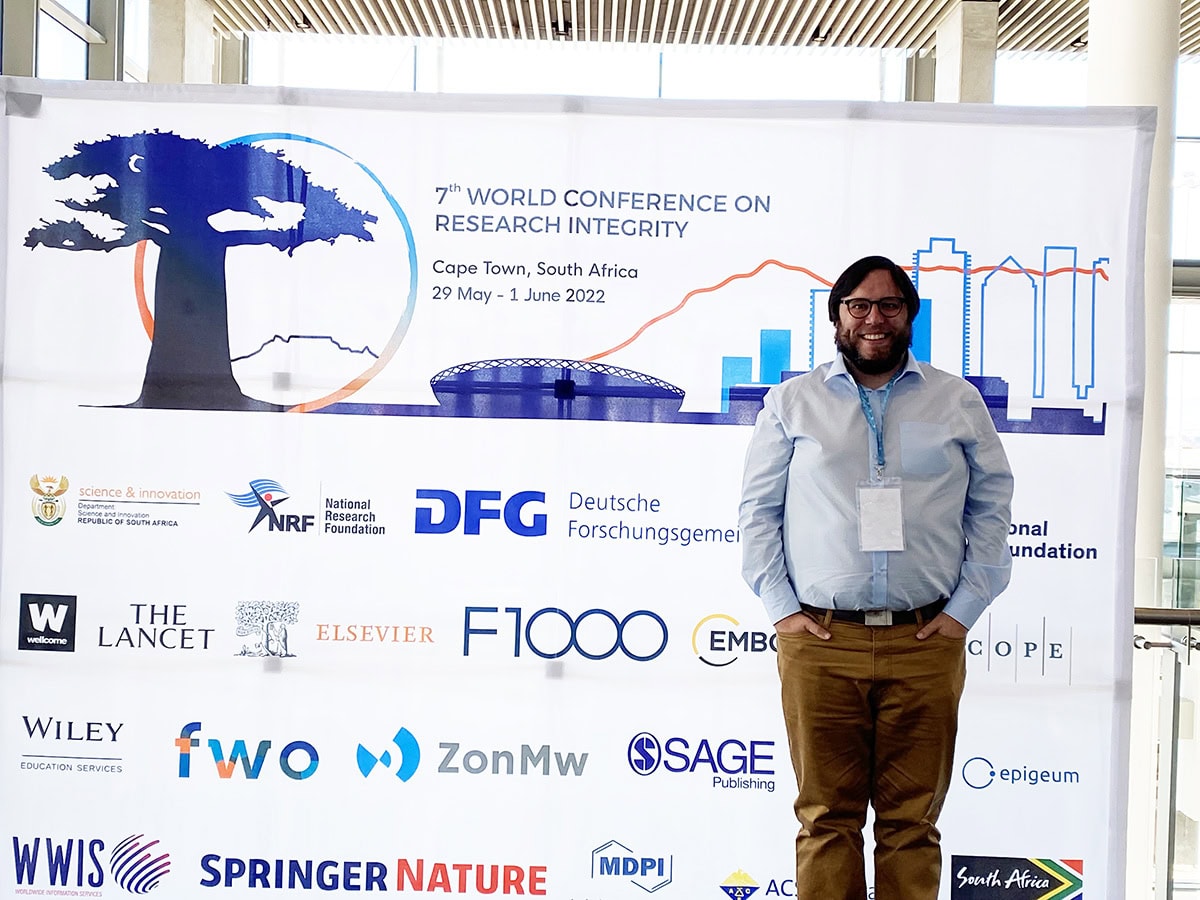
The 7th World Conference on Research Integrity was held in Cape Town, South Africa from May 29th to June 1st, 2022. The WCRI provides a forum for examining how to ensure research is conducted with rigour and to high ethical standards. Given the meeting was hosted in Africa for the first time, major topics of the conference were related to fostering productive and respectful international collaborations, diversity in study teams, and ensuring research integrity in lower resource settings. This offered fascinating perspectives and insights into areas of research I have not had much reason to consider in my own work to date, but will be useful to address, both practically and as topics for investigation, as my career progresses. However, my interests in the reporting of clinical trials, open science, and publication ethics, were also well represented throughout the conference.
I co-presented preliminary results of a project that formed the basis of one of my thesis
chapters. This research concerns tracking the reporting of clinical trials during the COVID-19 pandemic, and was presented as part of the conferences early career researcher track. The presentation is attached to my final report. It is always valuable to share findings for feedback with the community and to see the work of people with similar academic interests. As I near completion of my DPhil, building out my professional and academic networks through sharing my work, and taking in the work of others, is essential for the next steps of my career. Finding potential collaborators, advisors, and mentors has been a hugely valuable experience at conferences and WCRI was no exception. For instance, I was able to make connections to Profs. Ana Marusic and Ben Mol, both whose work I cite frequently, and meet collaborators and colleagues from Germany who I have not had an opportunity to interact with in person due to COVID-19. This is in addition to various new connections I made to colleagues throughout the
conference.
I’d like to thank Kellogg for providing me with a travel grant that allowed me to both share my work with, and learn from, my peers in the research integrity community. My research interests broadly deal with the topic of research integrity so having the ability to attend the flagship conference in the field as an early career researcher was incredibly valuable.
The Kellogg Travel Grant supported my attendance at the Preventing Overdiagnosis Conference (PODC) in Calgary, Canada. I was selected to do an oral presentation based on one of my DPhil projects, which analysed laboratory test use by children in Oxfordshire from 2005 to 2020. My research area of interest is in overuse and underuse of medical tests in children. Overuse refers to tests that are performed unnecessarily, where a particular test can bring more harm than benefit to a child. This can be in the form of unnecessary treatment such as antibiotics, and its associated side effects. It also costs the overall health system when resources are diverted away from those who would benefit from them more. Conversely, when a test is under-utilised and children miss out on diagnoses that would benefit from treatment, then there are associated harms in terms of poor patient outcomes and further straining health resources. We are at a critical point in time with health expenditure rising dramatically. Appropriate use of health care is one of the key solutions to the sustainability of health systems. My thesis aims to highlight areas of variation in diagnostic test use by children within the general practice setting. By reducing variation in care, we ensure that no matter who you are, where you live and what your background is, you will receive the same quality of care.
The PODC in Calgary returned to an in-person format since the pandemic. I enjoyed presenting the findings of my project and received thoughtful questions and feedback from experts in the field. I later found out I was shortlisted for the Lisa Schwartz Prize for early career researchers. Having attended the last face-to-face conference in Sydney in 2019, I was excited to connect with colleagues from around the world who are all working in varied areas of overdiagnosis ranging from breast cancer to cardiovascular disease and attention deficit hyperactivity disorder. While the conference focuses on one side of the coin, the keynote speakers emphasised that underdiagnosis remains a major concern, particularly for low and middle-income countries. I found it interesting to see how the conversations at PODC have evolved over the years I have attended it in 2016, 2019 and 2022. This year there was a focus on lessons learned from the pandemic. The two-year period was a natural experiment that allowed researchers to observe the rates of testing when people during the pandemic reduced their interactions with health care, highlighting areas of over-testing. For the first time there was also an emphasis on the alarmingly high contribution of health care to the climate crisis. If the health sector was represented by a country it would be the fifth-largest polluter globally. This, perhaps more than any other reason, should be the main impetus to identify and address areas of health care waste. Often the issue of overuse is not a conscious decision made by clinicians or patients, but is shaped by and entrenched within the systems that inform clinical decision-making. We need to make it easier for clinicians to request tests and treatments by providing the infrastructure, tools and support to deliver high-quality care that is feasible, cost-effective and equitable.
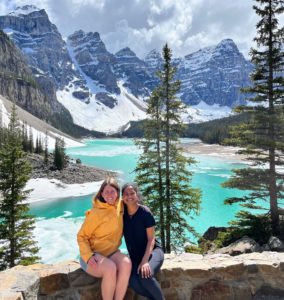 After the conference I was fortunate to visit the majestic Rockies and turquoise hued-lakes at Banff National Park, an incredibly beautiful corner of the world. Not a terrible way to unwind from a busy few days!
After the conference I was fortunate to visit the majestic Rockies and turquoise hued-lakes at Banff National Park, an incredibly beautiful corner of the world. Not a terrible way to unwind from a busy few days!
I am grateful to Kellogg College for providing me with the opportunity to travel to Canada attend the conference, present my research and foster new international collaborations to push this important area of research forward.
I undertook two research field trips in May 2022, for my DPhil The experiences of Christian postgraduate students at universities in England, to conduct interviews and get an ethnographic feel to my case study sites.
I took the train to Winchester on the 17th of May. I stayed in a little Airbnb close to the city centre and within walking distance of the University. I explored the University grounds on the first day, examining what sort of ethos is displayed through signs and displays, naming of buildings and how students interact on campus, how far it is from the city, etc. The following days I conducted six interviews with students and leaders, including the chaplain and the leader of student ministries in a local church. These mostly took place on campus. I also visited some places and events relevant to my study, such as services some interviewees pointed out as a source of encouragement to them in their faith – evensong at the Cathedral, for example.
On the 23rd of May I travelled to Manchester, where I carried out very similar activities to
those in Winchester, but had a much larger sample to draw on; I conducted 14 interviews.
All of these took place on campus, mostly at St Peter’s House and their café, which is in a
central location of the University and belongs to the chaplaincy. I interviewed 11 students
and the University Chaplain, the Catholic Chaplain, and a leader of a postgraduate and staff fellowship group. I visited both chaplaincies, some local churches and University buildings. I stayed in an Airbnb again, very close to campus and walked everywhere, discovering the city and the campus, to get a feel for the student experience. I took the train back on the 27th of May, to Oxford.
These two trips were essential and invaluable for my research. I am utterly thankful to the
College for allowing me to partake in these activities through their generous grant, which I would not have been able to finance myself.
View some of Silvi’s images from her trips
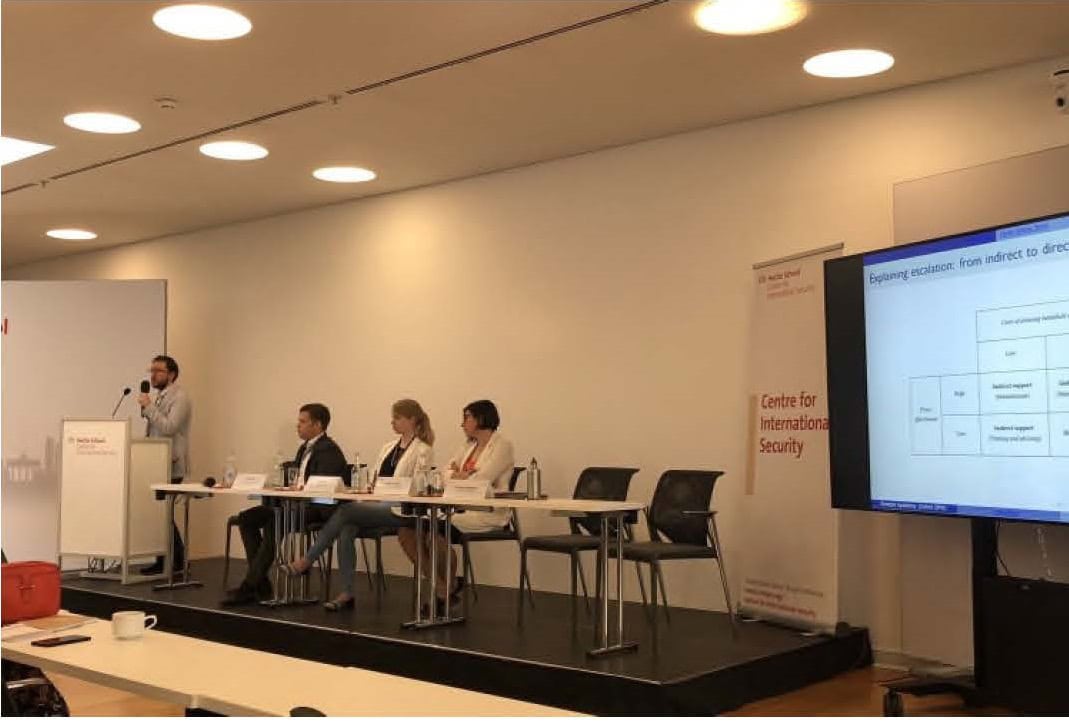
I was lucky to receive a Kellogg Travel Grant to fund my participation in the European
Initiative for Security Studies (EISS) 2022 conference at the Hertie School of Governance in Berlin. EISS is a pan-European, multidisciplinary network of scholars of security studies in Europe. It is the largest and most diverse network of its kind. The goals of EISS are to overcome the existing fragmentation in the study of security and defence across Europe, and to contribute to public debates through academic research and instruction. I recognise my own goals and ambitions in these values: I also aim to contribute to developing a better and multidisciplinary understanding of security studies in Europe to inform better security and defence policy. Throughout my DPhil years, I have strived to realise this goal, by researching external intervention in civil wars, teaching international security and conflict, and working with international security institutions. EISS 2022 represented an excellent opportunity to showcase my research and meet likeminded people in this field.
At EISS, I presented my research at a panel on “External Sponsorship and Conflict
Intervention”. The panel was made up only of PhD/DPhil students, which allowed each of us to showcase the cutting-edge research that we are doing. I presented my dissertation on the escalation of external support by foreign states in civil war. ‘Why’ I asked, ‘do some states move from providing military assistance to one or more warring parties, to partaking in combat with their own armed forces?’ I argued that states choose to intervene directly when they want to have rapid military impact, their proxy is unable to transform the resources provided into effective combat power, and the costs of escalation are limited. At the conference, I presented the theoretical argument as well as the empirical evidence for my first case study, consisting of archival evidence on Fascist Italy’s intervention in the Spanish Civil War (1936-39).
The EISS was the first opportunity to present my work in person beyond Oxford after two
years of online-only conferences and workshops. I could finally experience the joy and
enthusiasm of delivering my presentation, chatting with my fellow panellists during and after the panel, and having a nice dinner with other participants at the end of the day. I would like to thank the Kellogg Travel Grant awarding committee for allowing me to have this excellent experience with their financial assistance.
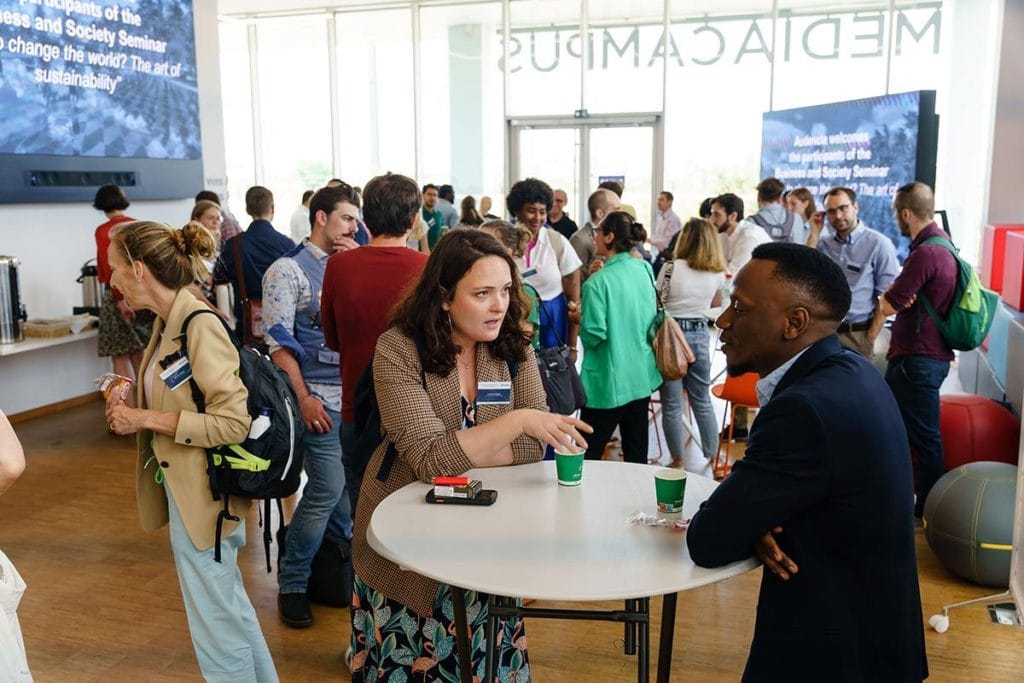
Owing to calls from global leaders to transform the current world systems, the role of
science and research has never been this critical. The necessity to accelerate the
sustainability transition by providing objective, evidence-based ways to solve
problems, for example, is on top of most organisations’ agendas. Indeed, this is key
to guiding governments, businesses, and industry on how to respond to society’s
needs and the environment. The Business and Society conference dubbed “How to
change the world? The art of sustainability” was one of such initiatives that aimed at
contributing to this discourse. I am glad to have been part of the 90 international
scholars & Ph.D. students who spent two days discussing their research in sustainable
business, corporate social responsibility, sustainable development, social innovation
& entrepreneurship.
My DPhil work concerns sustainability and innovation in the energy sector. This
involves studying what strategies can align the electricity sector to target poverty
reduction, inequalities, and ultimately sustainable development in Sub-Saharan Africa.
Specifically, I am investigating pathways through which private companies in the
renewable energy sector can deliver affordable electricity beyond lighting. At the
conference, I presented one of my DPhil papers emphasizing the role of partnerships
and innovations in accentuating electricity access to target multiple development
goals.
The event was a great opportunity as it allowed me to connect with like-minded
scholars whose support is instrumental in building my academic career and improving
my understanding of the issues in my field of expertise. The symposium was an
excellent opportunity for me to share my work and receive feedback from colleagues
and experienced scholars in my field. I hope to build on these engagements in the
near future to forge collaborations on different study topics.
I am profoundly grateful to my college, Kellogg, for the support through the travel grant,
without which it could have been much more difficult to attend such events.
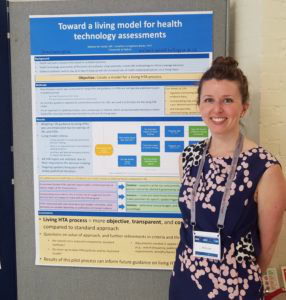 I attended the EBMLive conference 18-20 July in Oxford and presented my poster titled Toward a living model for health technology assessments It was an enriching experience to discuss living evidence synthesis with other colleagues who shared a passion for the topic and could provide valuable feedback on the work I am doing in the field. The grant has helped by defraying some of the expense of attending the conference, thank you for offering the Travel Fund Grant.
I attended the EBMLive conference 18-20 July in Oxford and presented my poster titled Toward a living model for health technology assessments It was an enriching experience to discuss living evidence synthesis with other colleagues who shared a passion for the topic and could provide valuable feedback on the work I am doing in the field. The grant has helped by defraying some of the expense of attending the conference, thank you for offering the Travel Fund Grant.
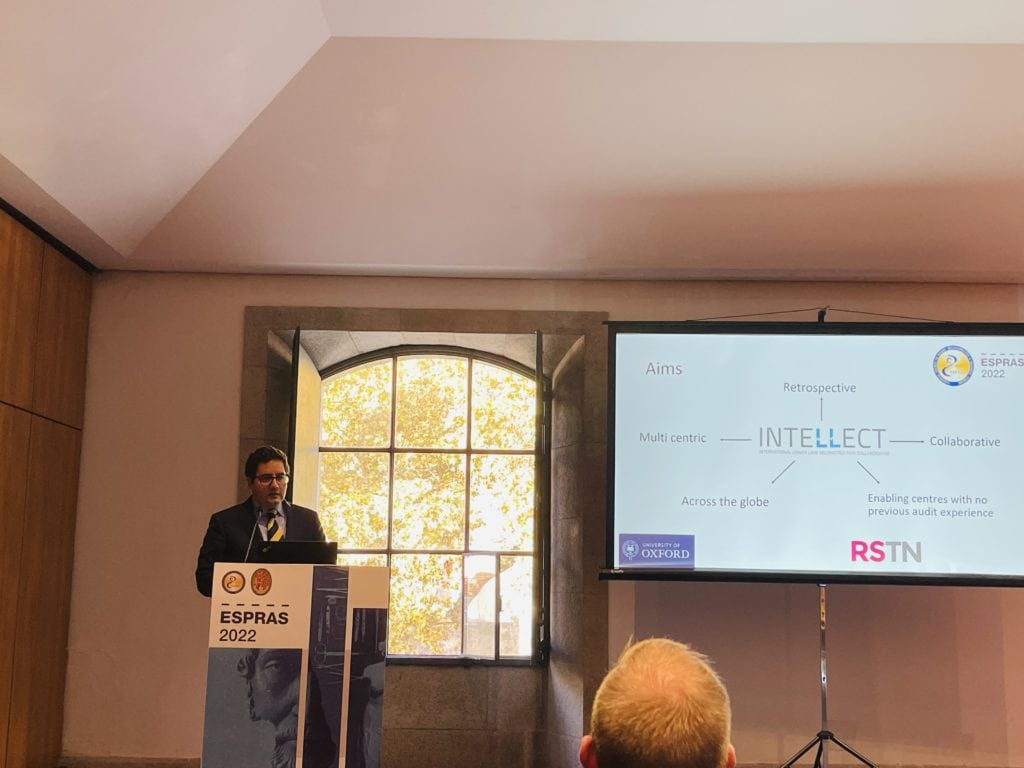
The European Society of Plastic, Reconstructive and Aesthetic Surgery (ESPRAS) is the confederation that brings together the European national societies and associations of Plastic Surgery. The ESPRAS scientific congress is held every four years with a programme that combines invited key speakers and free research papers. As part of my DPhil in Evidence-Based Healthcare I have been working on gathering data to better understand how open lower limb fractures are treated worldwide. I was honoured that the ESPRAS Scientific Committee accepted the INTELLECT study for presentation this year in Porto, Portugal. This allowed me to disseminate my research among surgeons with an interest in lower limb reconstruction. I received very positive feedback and was able to meet other clinicians with similar interest and happy to establish new collaborations! I just want to thank Kellogg College, as the Kellogg Travel Grant allowed me to cover most of the expenses for this meeting.
As a DPhil candidate in Sustainable Urban Development at Kellogg College, my research focuses on how post-9/11 counter-terrorism surveillance has informed, impacted, and contributed to the geographical reimagining and remapping of Arab and Muslim communities in New York City.
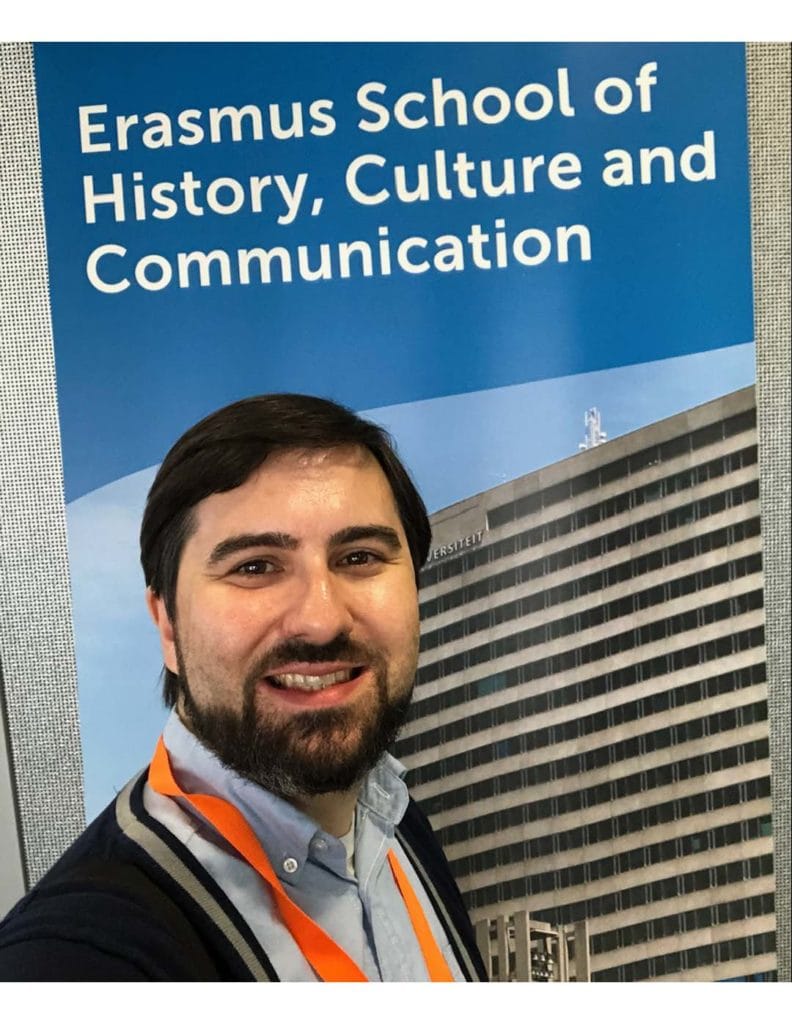 Through the support of a Kellogg College Travel Grant, I was able to present my work at The 9th Biennial Surveillance & Society Conference, hosted at Erasmus University Rotterdam in The Netherlands, June 1-3, 2022. Organised by the Surveillance Studies Network (SSN), this academic gathering is the preeminent and largest conference in the world devoted to examining surveillance and its social implications. This year, this event was also sponsored by the Centre for Big, Open and Linked Data (BOLD) Cities and the Erasmus Initiative on the Societal Impact of Artificial Intelligence (AI). Additionally, before the conference formally opened, I was invited to participate in the inaugural SSN Doctoral Student Colloquium on May 31st, which included a selection of specialized presentations and workshops for early career researchers.
Through the support of a Kellogg College Travel Grant, I was able to present my work at The 9th Biennial Surveillance & Society Conference, hosted at Erasmus University Rotterdam in The Netherlands, June 1-3, 2022. Organised by the Surveillance Studies Network (SSN), this academic gathering is the preeminent and largest conference in the world devoted to examining surveillance and its social implications. This year, this event was also sponsored by the Centre for Big, Open and Linked Data (BOLD) Cities and the Erasmus Initiative on the Societal Impact of Artificial Intelligence (AI). Additionally, before the conference formally opened, I was invited to participate in the inaugural SSN Doctoral Student Colloquium on May 31st, which included a selection of specialized presentations and workshops for early career researchers.
Conference sessions covered a wide range of surveillance-related research topics. These included smart cities, predictive policing, artificial intelligence, bodies and tracking, privacy law, algorithms, sustainability, borders and migration, housing, law and technology, data justice, public health, intelligence and national security, and facial recognition, among many others.
Participating in this unique conference and colloquium provided me with exceptional opportunities to discuss my research with and gather constructive feedback from fellow doctoral candidates and world-leading scholars in surveillance studies. In fact, input received from my presentation has inspired me to continue to further develop my research in new directions. Being involved in this event also allowed me to deeply immerse myself in global discussions, debates, and cutting-edge research about the future of cities and the role of surveillance in the evolution of urban environments. Additionally, since this was the first time this biennial conference has convened since 2018 due to the COVID-19 pandemic, I had the rare chance to personally connect and network with many professional colleagues, peers, mentors, and scholars within this academic community.
None of these experiences would have been possible without the support of Kellogg College. I would like to express my deep gratitude to the College for providing me with crucial funding to attend this conference and thank my supervisor Dr David Howard, a Fellow of Kellogg College, for his support for my travel grant application and ongoing guidance.
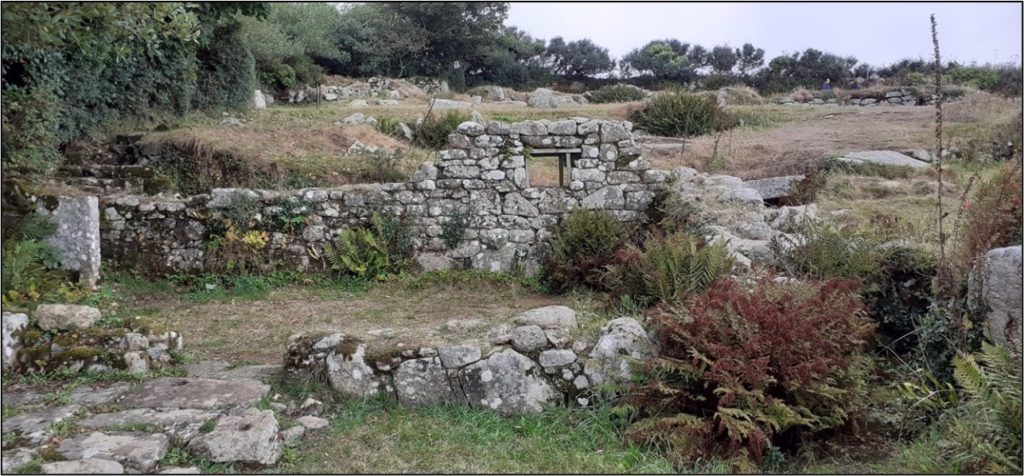
I have recently returned from a wonderful few days in Cornwall. This was a research trip, very kindly supported by the Kellogg College Travel Grant. My principal goal was to get a real feel for the Cornish landscapes and its archaeology, in the hopes of forming a deeper contextual understanding with my own study area of Wales. The subject of my DPhil research is in defining and characterising a mysterious kingdom known as Brycheiniog (pronounced bruh-kine-eeog), which is thought to have been centred on the upper Usk Valley – the Usk being the river that rises in the western Brecon Beacons (mountain range), flowing through the town of Brecon, and making its way eventually all the way down to the Severn Estuary. I am a landscape archaeologist – which means that I take a particular interest in looking at how landscapes have been knitted together through time using a variety of [usually] non-invasive techniques.
This has been such an insightful research trip, and my thanks again to Kellogg College for the financial support to make this happen.
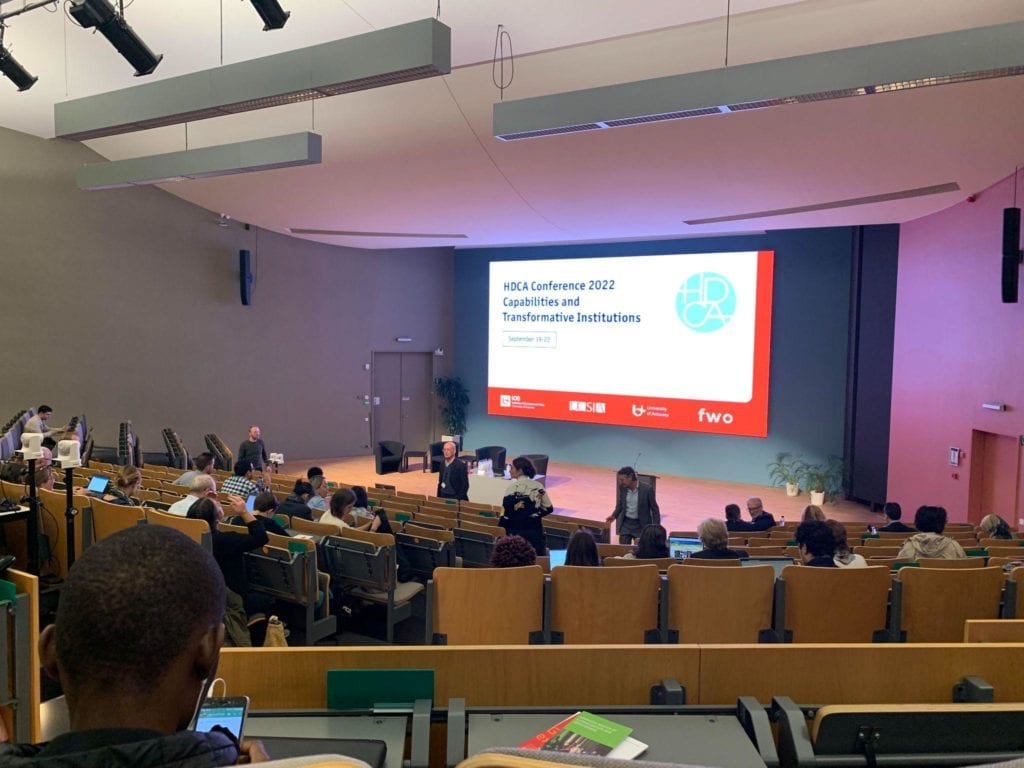
My doctoral thesis explores the dynamic relationship between labour market policy and worker wellbeing. To do this, I am utilizing Amartya Sen’s capability approach as a conceptual framework for evaluating the effectiveness of labour law designed to promote employee voice in the workplace. This represents a novel approach to employment relations research that opens up the possibility for new insights into the root mechanisms that drive modern employment conditions and their wellbeing outcomes.
From September 17th to 22nd I travelled to Antwerp, Belgium to attend the Human Development and Capabilities Association (HDCA) Summer School and Conference. The summer school is designed for graduate students who are working with the capability approach (CA) to develop their knowledge and understanding of its key concepts. Over the span of two days, I participated in several sessions lead by senior HDCA academics on the following topics:
– Capabilities and Health Equity
– Capability Measurement
– Development Ethics
– Children, Education, and the Capability Approach
During the summer school, I also participated in two breakout groups where each student presented their research. I provided and received valuable feedback regarding specific research challenges such as capability measurement issues, conceptualization, and operationalization. I cultivated friendships with many of the other students and plan to stay in touch with them moving forward.
Following the summer school programme, I attended the HDCA conference. This year’s theme, “Capabilities and Transformative Institutions,” was particularly relevant to my research and as a result, there were several sessions that I found useful and interesting such as:
– Consequences of market dominance for inequalities and living standards
– Measuring wellbeing in advanced economies
– Health, Lifestyle, and Preferences
– Measuring multidimensional Quality of Employment
– Transformative Institutions, Future-Making, and the Capability to Aspire
I also presented a research paper I wrote for my doctoral thesis outlining my evaluative framework for employee voice legislation at the young-scholar-meets-senior-scholar session: socio-economic policy. This session allowed me to engage with other doctoral students and senior scholars utilizing the CA for similar purposes. I received more valuable feedback and advice tailored specifically to my paper that will strengthen my research in ways that would not be possible otherwise.
Overall, I had a wonderful experience at the HDCA summer school and conference and hope to attend again in future years. There are no faculty members or other DPhil students in my department using the CA, so it was exciting to be surrounded by so many people as passionate as I am about the approach. I left feeling both motivated and inspired.
These funds provided me with the opportunity travel to Mae Sot, Thailand to conduct formative research for the first phase of my doctoral research through contributing to the cost of my flights. The purpose of the formative research was to understand parenting practises and coping strategies utilised by migrant families from Myanmar, currently residing in the Tak province.Over four weeks we conducted 18 caregiver focus groups with a total of 142 participants, and six adolescent groups with a total of 24 participants. We also ran a small-scale feasibility test of audio computer assisted self-interview survey measures. Caregivers and adolescents were recruited through Migrant Learning Centres across four rural and five urban locations. These focus groups provided insights into the challenges faced by caregivers in the region, and existing mechanisms for navigating the complex socio-political space, including managing daily stressors that are associated with parenting in this context. The results of this research will be used as groundwork for developing two interventions. The first will take a population-based approach in the form of a film-based intervention, evaluated through a cluster randomised-controlled trial. Caregivers identified as needing more intensive support will then be offered the opportunity to take part in a caregiver focused intervention, in the form of a culturally and contextually adapted parenting and mental health programme. The adaptation of the latter intervention will form a substantive part of my doctoral research and would not have been possible without the formative research, supported by the Kellogg College Travel Grant.
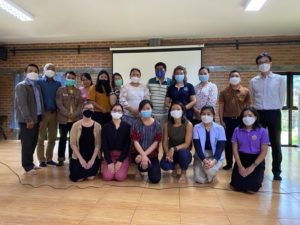
Convening The First Advisory Committee Meeting
We also convened the first meeting of the study advisory committee with members from Karen and Burmese Community Based Organisations (CBOs), representatives from Thailand Government Ministries and academic partners from Mahidol University and Chiang Mai University. The meeting was an invaluable opportunity to develop both academic and implementation networks as an early career researcher.
I am very grateful to Kellogg College for providing me with funding to conduct this research, which will form an integral part of my doctoral thesis.
The UK Stroke Forum is the main and largest national conference in the UK concerning stroke research, and it brings together multiple disciplines including medics, health and allied health professionals, psychologists and more. At the 2022 conference I presented my work entitled: ‘Predicting activities of daily living and subjective cognitive failures with the Oxford Digital Multiple Errands Test (OxMET)’. I was awarded a travel grant from Kellogg College to attend this conference.
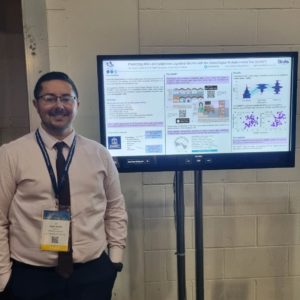 During the conference I attended many important talks, both related to my exact field, and as part of the wider stroke community research. I used this opportunity to also catch up with my peers who are also funded on Fellowships by the Stroke Association. These catch ups lead to collaboration arrangements which are now being worked on within our lab, so this alone was worth the trip. During my poster presentation, I met many clinicians who were interested in using the OxMET – the app I helped develop during my DPhil – and they have all signed up to using it in their clinical practice currently, another huge win for our roll out of the application.
During the conference I attended many important talks, both related to my exact field, and as part of the wider stroke community research. I used this opportunity to also catch up with my peers who are also funded on Fellowships by the Stroke Association. These catch ups lead to collaboration arrangements which are now being worked on within our lab, so this alone was worth the trip. During my poster presentation, I met many clinicians who were interested in using the OxMET – the app I helped develop during my DPhil – and they have all signed up to using it in their clinical practice currently, another huge win for our roll out of the application.
The conference was an excellent opportunity to network with likeminded researchers, which lead to a collaboration, and to present my research on our new app, which lead to new users requesting licenses. It was a very successful conference and I thank Kellogg College for part funding this trip.
In October 2023 I attended the Society of Vertebrate Palaeontology (SVP) annual meeting in Toronto, Canada. This international conference covers all topics on vertebrate
palaeontology and since my research is focused on early bird evolution, this conference
provided an opportunity to meet experts in my field and discuss my DPhil project with
other researchers. I presented a poster at this conference “The evolution and Phylogeny
of early Telluraves” where I was able to present my initial findings from my DPhil project. Without the Travel Fund Grant, I would not have been able to make it to this conference, an important step in my professional academic career.
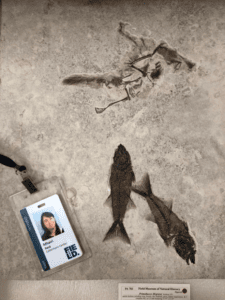 I was also awarded the Research Grant which allowed me to conduct crucial data collection in the USA. Part of my research is to study fossil birds in person at various museums around the US. This grant allowed me to study the fossil collections at the
I was also awarded the Research Grant which allowed me to conduct crucial data collection in the USA. Part of my research is to study fossil birds in person at various museums around the US. This grant allowed me to study the fossil collections at the
Smithsonian in Washington DC and the Field Museum in Chicago. Being able to study and take photos of these fossil is an integral part of research where I make anatomical comparisons of a specific clade of birds (Telluraves) and use these comparisons to understand their evolutionary history through morphology. Thank you Kellogg College!